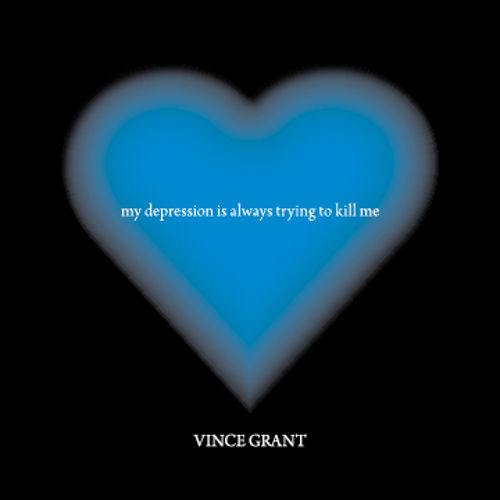As the name of the EP so clearly indicated, depression is at the heart of the five-song offering by Vince Grant. In 2013, it was estimated that some 4% of the population in North America suffers from depression; the numbers aren’t that much better in other places in the world. And yet, there is still a taboo when it comes to talking about depression, especially in men.
This makes Grant’s offering all the more important. His new debut EP, My Depression Is Always Trying to Kill Me, initially set to be released in February, is inspired by his experience with depression. If you listen to the five tracks in order in one sitting, it feels like you are listening to a very intimate, uplifting, and inspiring TED talk about one person’s journey through mental illness. While Grant takes care of the vocals and the acoustic guitar, he also seeks the help of Doug Grean with electric guitars, bass, and keyboards, and of Keith Larsen with drums.
 My Depression Is Always Trying to Kill Me was written after the Los Angeles-based Grant managed to deal with the alcohol and drug problems he developed in an attempt to self-medicate when what doctors were prescribing didn’t work. The five tracks on the EP will strongly remind listeners of R.E.M., Manic Street Preachers, and Elliott Smith; the sounds of all five are set within a limited range, making it a match for lovers of alternative rock.
My Depression Is Always Trying to Kill Me was written after the Los Angeles-based Grant managed to deal with the alcohol and drug problems he developed in an attempt to self-medicate when what doctors were prescribing didn’t work. The five tracks on the EP will strongly remind listeners of R.E.M., Manic Street Preachers, and Elliott Smith; the sounds of all five are set within a limited range, making it a match for lovers of alternative rock.
The gentle, acoustic guitar-led melodies in “Melancholia”, “Edge of the World”, and “Sweet Addiction” create a somewhat somber context which is made uplifting through the contrasting lighter contributions of other instruments such as drums, electric guitar, and bass. Grant’s vocals weave in and out of both extremes, between the darkness of “Melancholia” – “I woke at dawn/To find her sitting at the edge of my bed/You see…/She’s always lived there/Leaving me for dead” – and the light of “Edge of the World”: “Sometimes/I stand in the night wind/And I look up/Asked to be forgiven”.
“Oceans II” and “How Many Times You” are both uptempo, drum-driven tracks that seem to celebrate hope without ignoring the anger and darkness one might feel when struggling with depression. The range of emotions in the EP is a reflection of the reasons Grant wrote it in the first place: “I write songs to cope. I’d like to say I write songs to heal, but that may be asking too much.” No doubt listeners will wish both Grant and other countless individuals dealing with depression healing, be it through music or something else.
Vince Grant’s music is available on SoundCloud; more information about him is available on his official website.
Pictures provided by Independent Music Promotions.
First published here on Blogcritics.

